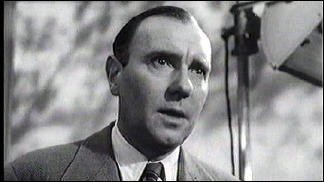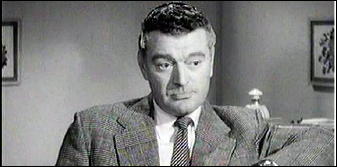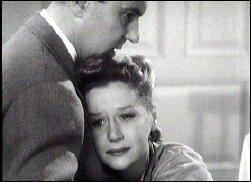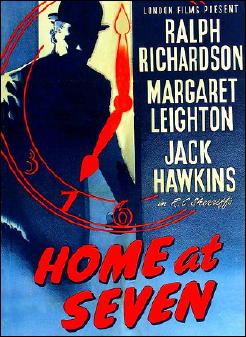Mon 7 Mar 2011
A Movie Review by Dan Stumpf: HOME AT SEVEN (1953).
Posted by Steve under Mystery movies , Reviews[6] Comments
HOME AT SEVEN. British Lion Film Corp., 1952. Released in the US as Murder on Monday, 1953. Ralph Richardson, Margaret Leighton, Jack Hawkins, Campbell Singer, Michael Shepley, Margaret Withers. Based on a play by R.C. Sherriff. Director: Ralph Richardson.

That scene toward the end of Interrupted Journey came strongly to mind as I watched another British Film, Home at Seven, the only film ever directed by Sir Ralph Richardson, and a pleasant surprise from start to finish.
When Great Actors turn to Directing Fillums, they often get a bit mannered. Sometimes unbearably so. I’m reminded of Laurence Harvey’s awful The Ceremony and John Wayne’s ponderous The Alamo. Even films I rather enjoy, such as Olivier’s Hamlet and Brando’s One-Eyed Jacks suffer from a certain amount of self-conscious narcissism.
Which is why I was so charmed by Home at Seven’s unpretentious spontaneity. From start to finish, it’s a quiet, workmanlike job of entertainment never flashy — boasting fine performances from Richardson (always a delight to watch) Margaret Leighton and Jack Hawkins.

I can tell a little about the plot this time: Richardson plays a Bank Clerk who returns home from work one night — carrying the evening paper; promptly at Seven as usual — to find his wife in tears. His first impulse is to soothe her, of course, and when she tells him he’s been missing for the last 24 hours, he poohpoohs the notion, pointing out that he’s clean, shaved, his clothes not slept in, and carrying the Monday Paper: Hardly the appearance of a man who’s lost a day.
Surely, he tells her, it must have been a dream she had while napping. Must stop working so hard, and all that. At which point he discovers that it’s Tuesday’s Paper he’s holding.
It’s an intriguing notion to start a film with, and it gets better as Richardson discovers that money he was responsible for is missing and a close associate is dead. Very swiftly, the film becomes another paranoid nightmare, on the order of Interrupted Journey, but done with just a touch more realism and consideration to character.

Unlike the characters in most thrillers, everyone in Home at Seven seems perfectly real and very likable: Richardson’s Average-Guy Hero, his fretful wife, Jack Hawkins’ sympathetic Doctor and even someone named Campbell Singer as an apologetic but insistent Police Inspector. One gets a real sense of ordinary people who’ve had some awful intrusion into their lives and can’t figure how to cope with it.
There is a stunningly effective scene in Home at Seven where Richardson and his wife are at home and he thinks the Police are coming to arrest him for Murder. Sound familiar? I thought so too. But wait; Feeling the Long Arm of The Law at his back, Richardson sits down with his wife at the kitchen table and quietly begins to explain to her how to do the Accounts.
It’s a moment all the more touching for its restraint with both of them trying hard not to cry as they deal with the commonplace aspects of a nightmare, and it shows a sensitivity and intelligence that are just too rare in the Film Thriller.

March 8th, 2011 at 12:53 pm
As you say Richardson directs in a simple almost matter of fact manner that allows the viewer to really identify with the character’s plight, and everyone in the film personifies that dignified decentness of a certain type and class of Brit from that period.
I agree, that scene where he starts to tell his wife how to do the accounts is brilliant. It’s all the more powerful for being so truthfully observed.
Richardson was never as showy as Olivier or Gielgud — not even in showy roles like in Eugene O’Neill or the grandfather in GREYSTOKE.
Here he simply chooses to observe a man under a magnifying glass at a point of crisis in his life. He soft pedals the melodrama and instead finds the quiet tension of a man whose world is turned upside down.
Great review of a great little film.
March 8th, 2011 at 1:20 pm
I certainly want to see it now. It sounds like exactly the kind of film I enjoy…with any luck, such new broadcast networks as This TV, which are plundering English films of this era, or the more respectful cable stations such as TCM, will make it available soon.
March 8th, 2011 at 2:15 pm
I’ll have to track this down. Like Todd, this is sounds like the kind of movie I enjoy.
March 8th, 2011 at 3:02 pm
George and Todd
It doesn’t appear that the movie is commercially available on DVD, but at least three sellers on ioffer.com have collector-to-collector copies for sale. I don’t recognize their monikers so I can’t recommend one over the other, should you go that route.
— Steve
March 8th, 2011 at 5:36 pm
I think this has played on TCM at least once — which is where I think I saw it — though it may have been on the old Family Channel which had quite a few old British films in its lineup.
December 31st, 2013 at 11:47 pm
I recently bought DVD movie titled Home at seven from E-bay. I was very, very disappointed that it did NOT have Closed Captions. It is a must for the deaf and hard of hearing people. That movie is talky movie not much action.
I hope it will be shown with CC on TCM channel soon. PLEASE!!!!!Thanks, Cornelia Strohmeier of San Jose, CA